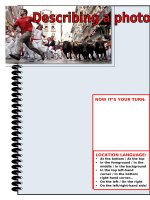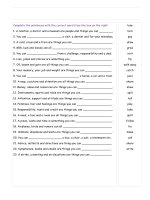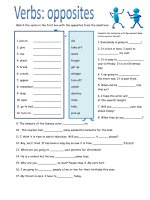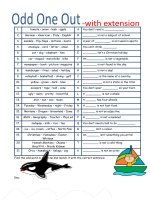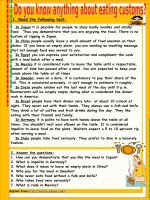islcollective worksheets preintermediate a2 intermediate b1 upperintermediate b2 adults elementary school high school re 46746327755c0b7a179edb6 66024456
Bạn đang xem bản rút gọn của tài liệu. Xem và tải ngay bản đầy đủ của tài liệu tại đây (274.8 KB, 4 trang )
Read the facts about the world’s most dangerous animals. Choose the correct word.
25 Deathstalker - this highly venomous scorpion residing primarily in North
Africa and the Middle East is responsible at/in/for over 75% of scorpion related
deaths every year. Although/Inspite/However healthy adults usually only feel
unbearable pain, children that are envenomated suffer fever, coma,
convulsions, and paralysis.
2
4
Africanized Honey Bee -An experiment gone wrong, in 1957 a Brazilian bee
keeper whose/which/who was trying to interbreed European and African honey
bees accidently let some of his “pets” get away/getting away/to get away. Much
more aggressive than their European counterparts, these genetically mixed
“killer bees” have since then spread throughout the Americas. They have come
to be feared in some regions because /since/because of their tendency to swarm
relentlessly and aggressively chase their victims for miles.
23 Rhino related deaths are not an uncommon occurrence in many parts of the
world. Having/To have/Have terrible eyesight, they are easy to startle and once
they have you in their sights it can be hard to make an escape (unless/if/in case
you can run faster than 40 mph). See the horn? Enough said.
22 Cone Snail. One drop of venom from this little bugger is enough to end 20
human lives. Sometimes colloquially known in/as/for the “cigarette snail,” it has
been said that when you sting/stung/are stung by this creature, you’ll have just
about enough time to smoke a cigaret before you stop breathing.
21 Stonefish. Lying camouflaged on the ocean floor, this ugly little mass of
destruction calmly waits for other fish swimming/to swim/swim by before
opening its jaws with lightning speed and consuming its prey…all in less
then/than/as .015 seconds. Also known as the “world's most venomous fish”,
stepping on its spines will at best cost you your leg and at worst, your life.
20 Great White Shark. These legendary predators have a terrible time
distinguishing in/among/between the edible and the non-edible. There chosen
method? Sampling. They sample buoys, boats, surfboards, humans, anything
that floats. Contrary with/Contrary to/Contrary for popular belief, however, they
really aren’t man-eaters. Humans are too bony, and after the initial bite, they
usually leave you to bleed out in the water.
19 Black Mamba. One of the most feared/feared/more feared creatures in the
world, some experts have even called it “death incarnate.” In Africa it is the
source of numerous myths and legends and it is widely known for being highly
aggressive, very fast, and attacking without provocation.
18 Cape Buffalo. Having never been successfully domesticated, this highly
unpredictable creature does not play nice with humans. Throughout Africa it is
known as the “widowmaker” or “black death” and is responsible for more
fatalities every year than no other/some other/ any other large animal on the
continent.
17
Poison Dart Frog. Packed into 2 inches of colorful amphibian is enough poison
for killing/to kill/killing an army of 20,000 mice. This means that with roughly 2
micrograms, or the amount that would fit on a pinhead, you could successfully
stop the heart of a large animal. And to make matters worse, the poison locates/
is located/is locating on the surface of the skin. You seriously can’t touch this.
16
Polar Bear. Unlike most other animals on this list, the world’s largest carnivore
is not afraid of/afraid for/afraid by you. It has no natural predators and will eat
anything that is even slightly meaty, includes/including/included other polar
bears. Although they generally don’t kill humans, it’s probably because there
aren’t many of them around to kill.
15
Box Jellyfish. Killing more people every year than sharks, crocodiles, and
stonefish combined, this box of death has been labeled “world’s most venomous
animal.” Its venom is so potent/as potent/very potent that in some cases
treatment consists with/ consists of/ consists in little more than last minute
CPR.
14
Boomslang. Although/Though/In spite of they are relatively shy and don’t
generally attack humans, when they do, things can get messy. Boomslang
venom is a hemotoxin that disables blood clotting. In few/other/some words, its
victims slowly die as they bleed out from every pore in their body.
13
Puffer Fish. Considered one of the most poisonous vertebrates in the world, it is
a delicacy in Japan. Puffer poison will, however/although/though, paralyze your
diaphragm and stop your breathing if you fail to prepare it correctly
12
While these predators may be wary of human interaction on/during/while the
day, after sunset the paradigm shifts. Although hyenas have been known to
hunt humans throughout history, the behavior tends increasing/to
increase/increase during wartime and disease outbreaks due to their strong
affinity for human corpses.
11
Komodo Dragons are not picky eaters. They will eat anything from birds to
water buffalos to humans and they have even been known to dig up bodies
from shallow graves. They are prodigious hunters and will wait stealthily until
their prey approaches after which they will charge forward, rip out its throat,
and retreat while it bleeds out. The only reason their human kill count is so low
is probably due to/because/as limited interaction as well as the fact that they
only really need to eat once a month.
Tse Tse Fly. This large blood sucking fly is the primary carrier of African
Sleeping Sickness and is, however/therefore/although, indirectly responsible for
killing up to a quarter of a million people every year.
10
9
When most animals are wounded they run away/run after/run into and hide.
Not leopards. When these dangerous creatures are wounded they become even
dangerous/even most dangerous/ even more dangerous. Not only that, but
they’re strong. Anyone who has watched the Discovery Channel knows that
they like to hide their prey out of reach. Translation: they drag dead antelopes
up trees.
8
7
Responsible for the majority of
snake related deaths in the world,
carpet viper uses a hemotoxin
similar with/similar to/similar of
that of the boomslang.
Unfortunately most of the bites
occur in areas that lack modern
medical facilities so/because/but
the victims slowly bleed to death
over the course of several weeks.
Meet the most venomous spider in the world, Brazilian Wandering Spider
, according to the Guinness Book of World Records. What makes this critter so
dangerous is also how it got its name – a tendency to wander. They are often
found to hide/hid/ hiding in houses and cars of densely populated areas, especially
during daytime. Not a good combination.
6
Due to/While/Therefore humans are generally not on their hit-list, some lions
have been known to actively seek out human prey. One famous case was that of
the Tsavo man-eaters in 1898 who mauled and killed 28 railway workers in
Kenya over a 9 month period.
5
Blue Ringed Octopus. About the size of a golf ball, don’t let its small stature fool
you, it holds enough venom to kill/venom enough/ to kill/venom enough for killing
26 full grown adults and as you may have guessed, there is no antidote. Assuming
that your friend ever gets bitten you had better to know/know/knowing CPR
because you can be sure that within minutes they will be completely paralyzed
and unable to breathe..
Boomslang. Although they are mostly herbivorous, hippos are also highly
aggressive and are widely regarded for/regarded as/regarded with one of the most
dangerous animals in Africa. They have been known to attack humans without
provocation even to the point of destroying entire vehicles.
4
3
Sitting at the top of its food chain the Saltwater Crocodile has been known to eat
everything from water buffalo to sharks. Because/As a result/In order to kill its
food it makes use of a technique called the “death roll” where it relentlessly flips
its prey over and over in the water until it drowns and then comes apart
2
The world’s largest land animal, elephants can be fiercely aggressive and have
been known/have known/ know to trample even a rhinoceros or two to death.
They seemingly have the capacity to display bouts of rage and have even engaged
in activities that have been interpreted as vindictive, razing entire villages in the
process.
1
Mosquito - Moving from one of the largest animals in the world we now come to
one of the smallest. As small as it is though, it is also the deadliest. It has been
estimated that mosquitos transmit diseases to almost 700 million people annually
in order to/resulting in/ according to 2 to 3 million deaths every year.
Source: www.list25.com

